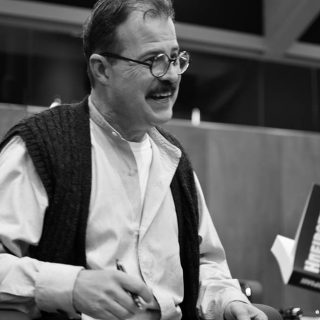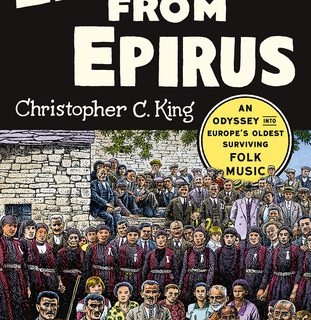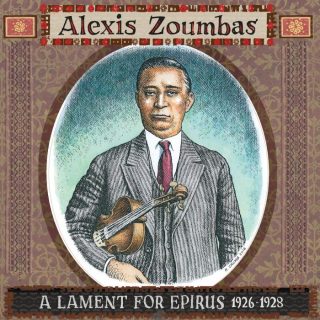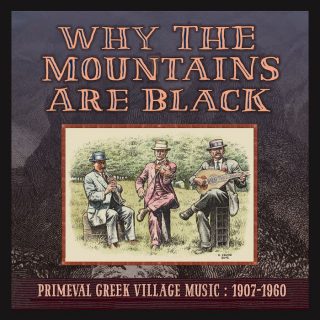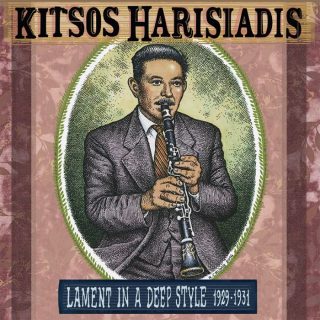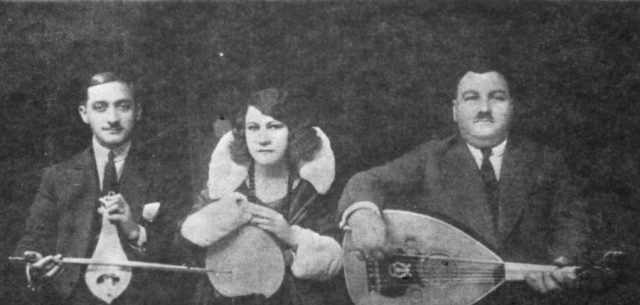Christopher King: An Evangelist for Greek demotic music
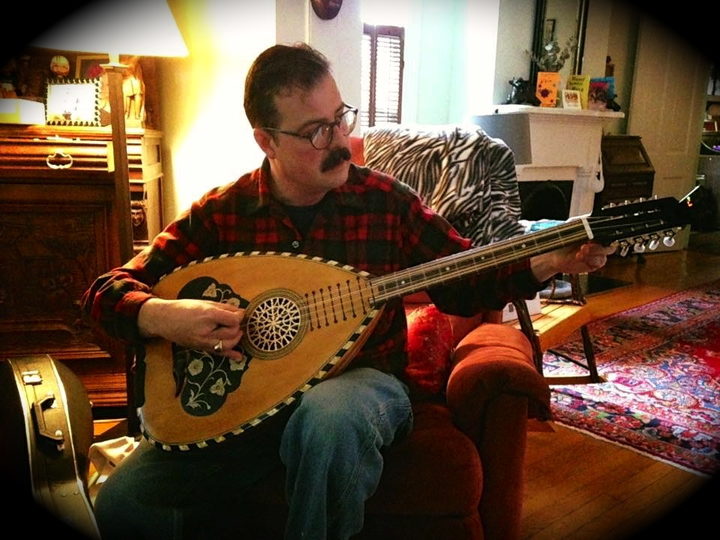
Christopher King’s first experience of hearing an Epiriot lament, by violinist Alexis Zoumbas, on a 78rpm recorded in 1926, sent him into a cathartic trance. Searching for a connection, Grammy-winning producer and curator King spent years researching and archiving music recorded between 1907 and 1960 from the rural hinterlands of mainland Greece and its islands. Several compilations of Epiriot music followed, and his critically-acclaimed book, Laments of Epirus received praise for drawing a wider interest into the forgotten sounds of demotic music, and into the evolution of song itself. For King, who hopes to find a permanent home in Greece for his archives, the haunting, guttural music of Epirus is both a “living link to antique Greek folkways” and a cathartic remnant of “a more ancient way of being”. This demotic Greek music may not be to everyone’s taste, concedes King, but copious amounts of tsipouro will convert most to its powerful pull.
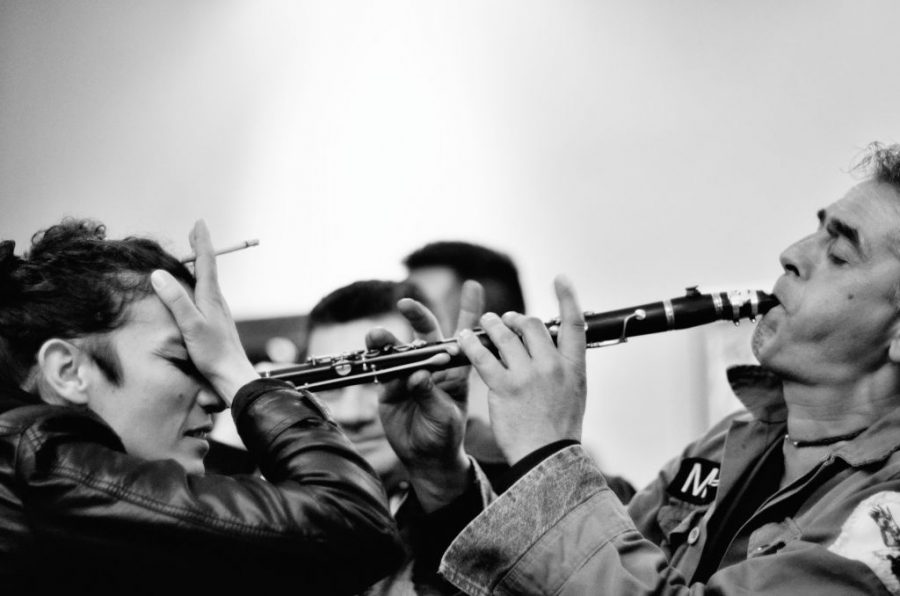
Yannis Chaldoupis ‘playing into the ear’ ©Menelaos Sykovelis
It was on a trip to Istanbul that King strayed into a gramophone shop that sold records made from the 1890s until the 1950s – and uncovered some of the most hypnotic sounds he had ever heard. The sound, he writes, was startling: “a dissonant instrumental played with an uncontrolled abandon”; a clarinet “sounded as if it were in the throes of death—bent, contorted, and skirting along the margins of control.” Those primal sounds, King gleaned, were from Epirus, where a rich folk tradition dating back to Homeric times still thrived.
- ©Doma Press
Christopher King looks like he could have stepped out of a movie set in the ’50s – in tweeds, round glasses, moustache and suspenders. King, who won a Grammy for his sound engineering on the album Screamin ‘ and Hollerin the Blues : The Worlds of Charley Patton, describes himself as an “obsessed” collector of 78 rpm phonograph records, counting among his treasures American folk music from the ‘20s and what is arguably, the most comprehensive archive of Greek demotic music. He recounts his discovery of Epiriot music as being ‘so transformative’ that it set him on a 12-year inquiry into the musical genre’s history. For King, infatuated with the music of the past and condemned to hear it only in scratchy recordings, Epirus was a place where he could touch it in the present – at the panigria and glendi where the intoxicating blend of violin and clarinet music stretched over 3 days of festive abandon, catapulting revellers into Dionysian passion and entrancing solemnity. “Conveying an emotion through music is one of the most profoundly mysterious techniques to learn but the old musicians know how: you must be able to transmit, graft an emotion onto a sound and they carry that sound through the instrument into the ears of the listeners.”
When I arrived home back in Virginia and played these discs, I immediately became entranced. But I was deeply curious— of what the meaning and purpose of this music was. It was both alien and yet familiar. So, my natural curiosity was to seek out not only all the demotic music from Epirus but also from the Peloponnese, Thrace, Macedonia, Crete, Thessaly.
King released a number of breath-taking compilations of this music, including Five Days Married and Why The Mountains Are Black, and collections by violinist Alexis Zoumbas and clarinettist Kitsos Harisiadis, both virtuosos he tries to track down in his compelling book Lament from Epirus. Zoumbas had emigrated to the US at the end of the Balkans Wars to escape a murder rap and died poor after playing violin to Greek diaspora communities in America. He was buried in a paupers’ cemetery in Detroit where King hopes to erect a plaque at Zoumbas’ grave with his name, dates of birth and death, the picture of a violin, and the words: “Shine on for as long as you live.” The book also recounts the story of the Sarakatsiana and the Roma people who pioneered Epirotic folk music and their descendants who continue the tradition today.
- cover illustrations by R.Crumb
It is easy to understand why King finds the outpourings of this otherworldly music transformative. The music originates in the mountains of Epirus and in the riverbeds of Acheron, the river of woe. In Greek mythology, the newly dead must traverse the river before entering Hades – the underworld. Little wonder that the music is imbued with subsuming sadness and longing. King describes it as “the sound of a looming asteroid right before it smacks into Earth, ending all life and hope… the echoing sound of the irrational and cruel.”
He admits to his obsession with demotic music to be ‘a form of insanity.’ So much so that King plans to move permanently to Greece from his native Virginia in 2021 to devote himself to establishing the Center for the Collection and Preservation of Greek Folk Music – a permanent home to document the genre’s history. King is still on the lookout for an institution that is willing and able to host him and his archives.
Greece is home. Nowhere have I felt more loved and welcomed than by the Greek people.I am honoured to be asked to talk about my love of Greek traditional music, one of the greatest cultural assets that I’ve ever encountered. And, it belongs to all the Greek people: a collective treasure.
What was it about Epiriot laments that even Greeks describe as ‘goats boiling’ that so moved you as to make it the focal point of your research for the past twelve years?
It was mainly that I heard something profoundly deep, human and “intentional” or purposeful in mirologia. When I first heard them on 78 disc by Alexis Zoumbas and Kitsos Harisiadis, it felt as if I was hearing something from my own musical-emotional past but also I could distinctly hear that the music had a deeper purpose. I simply did know its purpose or function at the time of listening. That’s why I devoted twelve years to understanding that purpose–what it is supposed to do for people–for villagers, for listeners, for musicians, for singers. You know, there used to be analogous forms of music like mirologia around the world, even in America. Songs of collective remembrance and catharsis through mourning. But they have largely disappeared except for in Epirus.
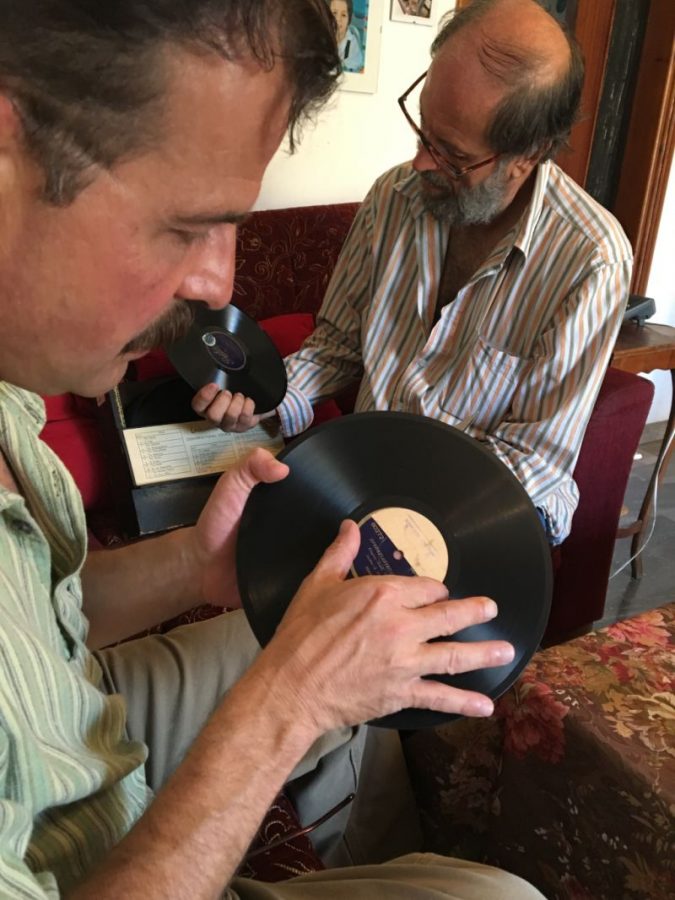
Christopher King with Elias Barounis©Image by KafKa (Katerina Kafentzi)
Do you play any of the instruments?
Yes, I play laouto and violin in the style of Epirus, specifically violin in the style of Zagori musicians like my teacher Kostas Karapanos. I’m not good enough to play panigiria but I wanted to understand both the technique and what it was like to have those sonic vibrations pass through your own hands into the ears of others.
Your obsession with Epiriot music has taken us through five compilation discs and a delightfully engaging book that is an erudite and informative cultural history of Epirus’s folk music. One does get the sense that Laments of Epirus, not unlike its title, is mourning for a lost world, of one drowned out by globalisation and technology. Did you expect it to evoke the response it has?
Yes, I wrote the book as a paean to Epirus and rural Greece but also as a “sad” love letter to all the folk music that has died as a result of modernity, globalization and the careless actions of unthinking humans. I think if we cared for those things that care for us–such as our folk music traditions–they would simply endure.
It seems as if your experiences with old music propelled you toward writing this ‘loving portrait of an idiosyncratic place, its deep history, and its music titans.’ When did you decide to write this book? Would it be equally appealing to someone not familiar with musicology or Greece?
I didn’t so much decide to write the book as the book decided to write me. I had already written deep and rhapsodic notes about Zoumbas and many other musicians from the region. It was actually the executive editor at W.W. Norton & Co. in New York who approached me to write the book since he was particularly moved by my notes in my music collections. The process of writing the book then was very organic. It was just an extension of the notes I had already been taking. And I wrote the book primarily to please my own self, my own curiosity. And so, it was eventually composed to be enjoyed by general readers–those neither with knowledge of musicology nor of Greece. In that sense the book was successful. Most people who have read it do not have such a background.
You have described Epirus as a ‘musical biosphere’ and of the local festivities retaining a purity of purpose. Do you believe that song and dance served much deeper psychological and existential functions, beyond entertainment, in Epirus’ unforgiving setting?
I certainly believe that it does and I’d venture to say that the same deep psychological and existential purposes of music in Epirus were far more widespread and persistent throughout the Greek-speaking world. Surely the urgency of music among the Pontics, the Cretans, some of the Cycladic islanders, the people in Macedonia/Grevena and Thrace and in Peloponnese has been and–in some cases–continues to be vital and central to the culture. Epirus does have an unforgiving environment and that feeds the music and the people. But I think other parts of Greece are also unforgiving. It is just that change has affected different places in varying degrees.
Are you concerned about the fact that now that you’ve written about this traditional music, it will become more visible, and therefore, it will change?
No. I think in most parts of Epirus the music will retain its vitality and value to the people–the villagers–simply because it serves a purpose. Only in larger places are the musicians and people going to modify or “dress-up” the music for outsiders, to impress them. This is detestable, but sadly, it is also natural. I think if music is a living tradition–as it is in parts of Epirus–then it will naturally resist change. For instance, when I helped bring the beautiful polyphonic group Isokratisses to Utrecht, Netherlands late last year of 2019, what they sang was not “museum-piece” music–it was honest music sung by honest people in their home and village setting. This really impressed the 3,000 Europeans (mainly non-Greeks) who attended their performance. Or to put it another way: Greece is also very well known for its cuisine. Has the fact that Greek cuisine is now very visible in the world changed and modified Greek cuisine? In most instances, the answer is “no.” I can go to this beautiful, quaint ouzeri in Vitsa where my friends Yiannis and Anthoula cook in the same way that they’ve been cooking for thirty years or more. I can expect the same delicious meze that I had twelve years ago. Ultimately, there is more of a risk of things changing internally due to domestic politics rather than from forces outside the tradition. Just think about tsipouro. I think about tsipouro a lot.
Your decision to move your collection to Greece is a huge step towards preserving Epirus’ intangible cultural heritage. An extraordinary gift to the Greek people and the world of music. How exactly do you propose to keep this living heritage alive?
Well, I’m actually moving my entire collection of Greek folk music: Epirote, Pontic, Cretan, Peloponnese, Thessaly, Thraki, Macedonia, Asia Minor, and Rembetiko to Athens as soon as an institution can be found that will host me, my archive and the work I intend to do. I don’t think I will have any role in keeping “this living heritage alive.” This is the responsibility of the Greek people–the musicians, the villagers and the people who live through this music. I’ll be constantly working to document the living traditions of Greek folk music as it exists and researching how these traditions connect to the past. Specifically, the early 20th century when these traditions were first recorded. I’ll do this by establishing a Center for the Collection and Preservation of Greek Folk Music in Athens. My model is the American Folklife Center in Washington, DC that is part of the Library of Congress.
Surprisingly, for a country with the most vibrant and vital folk music tradition in the whole world, there is no such centralized archive in Greece! So, I propose to create one in Athens and work to build a robust and thorough archive of 78 rpm recordings, antiquated media recordings and living recordings to document the traditions in Greece.
I will form “satellite” archives throughout Greece that will serve to highlight the regional music contributions found there. Obviously one of the satellite archives will be in Epirus–probably more than one since the region itself contains great diversity. Another will be in Santorini and will be hosted by La Ponta, Symposion Cultural Center. I hope to have satellite archives associated with the Center I propose throughout Greece. I’ll be writing, publishing, presenting and working to promote Greek folk music throughout Europe and America. In the best of all worlds, I could be thought of as an evangelist for Greek demotic music.
I am on a quest to find a suitable building to house the archive and develop a robust Archive of Epirotic Music, which can actively collect recordings and artifacts of this largely intangible cultural heritage. I plan to make this my life’s work and I want to give back to Epirus as much as what it has given me.
You’ve mentioned visiting every August for the ‘panigyri’ and in November for the tsipouro season. How do the local Epiriots react to you? Describe how being in Vitsa, in Epirus is different from Virginia, where you live.
In Epirus I’m treated as a brother. As a son. As a villager. Not as an outsider. It is no hyperbole to state that I have more friends in Greece–especially in Epirus–than I do in the US. When I’m in Vitsa I am at home. The concerns of the village are also my concerns. And my friends in Greece care about me. Here in Virginia I live in a very rural place. It is actually much smaller than Vitsa in population. But here I don’t have the joy of loving friendship. And there is no tsipouro in Virginia.
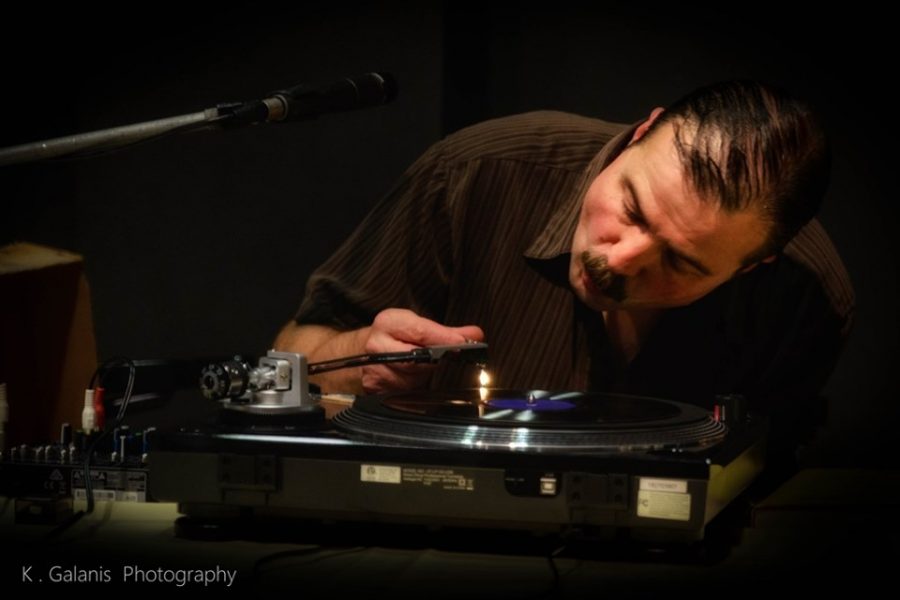
You mentioned working on a new non-fiction book about murder ballads set in Greece and America! Do you find that folk music’s coarse appeal lies in it being so inextricably linked to crime and deeply entrenched social issues?
I’m actually working on several books about Greece and America, including the non-fiction book about murder ballads. I guess I have to admit that I prefer the darker stories of our collective human history, including crime and murder ballads. They are universal but they are also engrossing. I’m working on a short novel–I have been for several years–about a murder in southwest Virginia but told through the discrete symbolism of Greek mythology. I’m also working on a book about the relationship between inter linguistic-ethnic patterns of migration in northern Greece (from Epirus to Thrace) and the music produced in the regions. I’m also working on a CD/LP project about the music of Grevena as well as a stand-alone collection of music from Asia Minor. All of this while I’m working on a “grand history” of folk music in America.
When we spoke last, you were considering moving to Vitsa in Epirus. Have you?
Sadly, no. Like most people in 2020, I’ve been caught in an uncomfortable web of suspended animation. I was preparing to move to Greece with my daughter when all hell broke loose with the Coronavirus and the political unrest in the US. So, I’ve been fortunate in that I can cut firewood, tend to my house, take care of my daughter and write about Greece. But no, I haven’t moved yet.
Christopher King was born and raised in southwest Virginia and studied philosophy at Radford University. Over the course of the last ten years, he has researched the tradition of Greek demotika songs, especially in Epirus. In 2018, W.W. Norton published his book, Lament from Epirus: An Odyssey into Europe’s Old Surviving Folk Music, to wide critical acclaim. The Greek translation has been published by DOMA and was #1 on the best-sellers list for several weeks.

